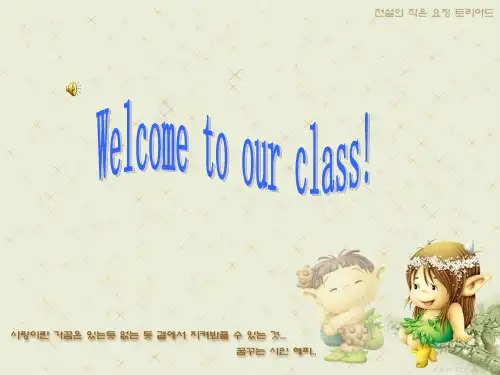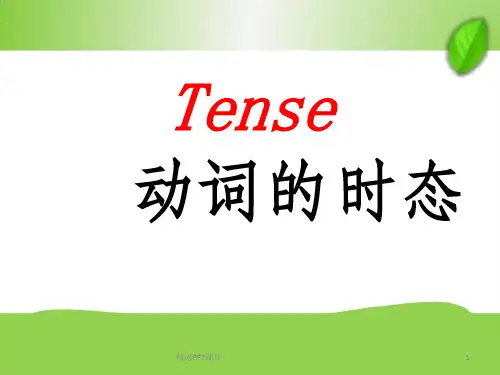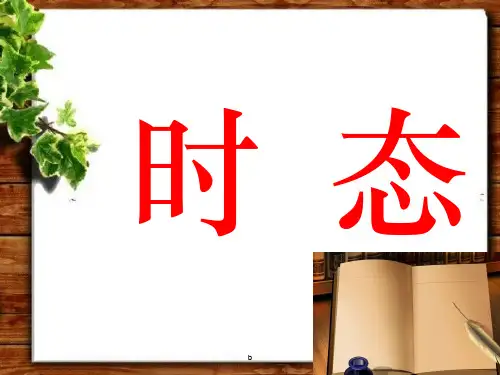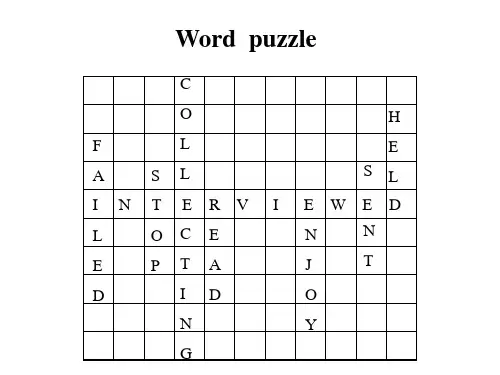初中英语八种时态归纳PPT课件
合集下载
初中英语八种时态讲解-课件PPT

什么情况下用?
①表示经常或习惯性的动作或存 在的状态。②表示主语通常的能 力、兴趣爱好、和性格特征。③ 表示客观的事实或真理。④表示 按照时刻表或已经计划安排好的 将来行为。(只限于是go, come, leave, arrive, begin, start, take off, stop, be等表示开始或移动意义的 词。)⑤在时间状语从句和条件 状语从句中,主句用一般将来时 (will+动词原形),从句中用一般
变“y”为“i”再加-ed
worry→worried
cry→cried
1. He____(be, was, were, been) here a moment ago. 2. They ____(be, was, were, been) here just now. 3. The scientists _____(leave, leaves, leaved, left) for America yesterday. 4. Last week we ______(visit, visited ) the Science Museum. 5. When I was a child, I often ____(play, played) football. 6. The students ran out of the classroom as soon as the bell ____(ring, rang, rung).
一般过去时
概念:过去某个时间里发生的动作或 状态;过去习惯性、经常性的动作、 行为。 时间状语:ago, yesterday, the day before yesterday, last week(year, night, month…), in 1989, just now, at the age of 5, one day, long long ago, once upon a time, etc. 基本结构:①be动词;②行为动词 否定形式:①was/were+not;②在行为 动词前加didn't,同时还原行为动词。 一般疑问句:①was或were放于句首; ②用助动词do的过去式did 提问,同时 还原行为动词。
英语时态8种基本时态讲解.ppt课件

4)动词过去式变化规则。 a)一般情况下的词加-ed. work---worked call----called b)以不发音的字母e结尾的单词直接加-d . live----lived change----changed smoke----smoked die----died graduate----graduated drive----drove
8.过去完成时 表示动作发生在过去某一时间之前已经完成的动作或状态, 强调“过去的过去”, 常与 by the time, by the end of…,before , by 等引导时间的状语连用。
基本结构 主语+ had + 动词过去分词 + 其他成分 When I got to the cinema yesterday the film had begun already. He had learned English before he came here.
现在完成时与一般过去时的区别: 1)现在完成时侧重于对现在的影响;而一般过去时侧重于某一动作发生在过去某个时间或某段时间。即现在完成时侧重于现在的结果,而一般过去时侧重于动作发生的时间。例如:
I have seen the film. 我看过这部电影。(现在我仍记得电影的内容) I saw the film three days ago. 三天前我看了这部电影。(强调是三天前,而不是别的什么时候看的电影)
be going to含有“打算,准备”的意思,而will则没有这个意思, She is going to lend us her book. He will be here in half an hour.
be about to+V.原形(意为马上做某事,在时间上指最近的将来) I am about to leave school. 不能与表示时间的副词连用。 They are about to set out.(√) They are about to set,变y为i加-ed. study----studied carry----carried cry----cried try----tried d)以元音字母+y结尾的单词直接加-ed. play----played stay----stayed
8.过去完成时 表示动作发生在过去某一时间之前已经完成的动作或状态, 强调“过去的过去”, 常与 by the time, by the end of…,before , by 等引导时间的状语连用。
基本结构 主语+ had + 动词过去分词 + 其他成分 When I got to the cinema yesterday the film had begun already. He had learned English before he came here.
现在完成时与一般过去时的区别: 1)现在完成时侧重于对现在的影响;而一般过去时侧重于某一动作发生在过去某个时间或某段时间。即现在完成时侧重于现在的结果,而一般过去时侧重于动作发生的时间。例如:
I have seen the film. 我看过这部电影。(现在我仍记得电影的内容) I saw the film three days ago. 三天前我看了这部电影。(强调是三天前,而不是别的什么时候看的电影)
be going to含有“打算,准备”的意思,而will则没有这个意思, She is going to lend us her book. He will be here in half an hour.
be about to+V.原形(意为马上做某事,在时间上指最近的将来) I am about to leave school. 不能与表示时间的副词连用。 They are about to set out.(√) They are about to set,变y为i加-ed. study----studied carry----carried cry----cried try----tried d)以元音字母+y结尾的单词直接加-ed. play----played stay----stayed
中考英语专题 --八种常见动词时态讲解(共49张PPT)

二、一般过去时
1.一般过去时的结构:
主语+动词过去式+其它
I did my homework yesterday.
(did就是do的过去式) 否定构成:didn’t+动原 一般疑问构成及简答举例:Did+主语+动原+其它? 特殊疑问句举例:What did he do yesterday? When did he get up this morning?
火车明天上午六点开。
6)在复合句中,当主句是一般将来时,时间状语 从句或条件状语从句的谓语动词只能用一般现在 时来表示将来。 例如: I'll tell him the news when he comes back. 他 回来时,我将告诉他这个消息。
If you take the job , they will talk with you in greater details. 如果你接受这份工作,他们将和你谈谈细节。
I do my homework every day.
1.改为一般疑问句并回答。 Do you do your homework every day? Yes, I do./No, I don't. 2.改为否定句。 I don't do my homework every day.
Jim does his homework every day. 1.改为一般疑问句并回答。 Does Jim do his homework every day? Yes, he does./No, he doesn't. 2.改为否定句。 Jim doesn't do his homework every day.
初中英语八大时态-讲解ppt课件

例题
Li Ming didn’t understand what American people
said,_____?
A.couldn’t he
B.could he
C.didn’t he
精选PPT课件 D.did he
8
三、现在进行时
1.用法:
A.现刻动作:目前正在发生的动作。
B.现阶段动作:目前一个时期一直在进行的 动作,此刻不一定在进行。
I have worked.
I had worked.
精选PPT课件
5
•各种时态的用法
精选PPT课件
6
一、一般现在时
1.用法:A.现在经常性的动作或状态 B.客观事实和真理。
2.标志词:always, usually,often, sometimes, never, every day /week /month/year/…
例句:I am working.
例句:I was working.
精选PPT课件
3
一般将来时, 将 will加原型。 来 过去将来时,
would加原型。
I will work.
I would work.
精选PPT课件
4
完 成
现在完成时, have/has加过分。 过去完成时,
时 had 加过分。
tomorrow,in three days,in (the)
future,next week/month/term…,
from now on 精选PPT课件
14
4.shall/will/be going to之间的区别:
shall往往用于第一人称疑问句, will可用于任何人称。
英语八大时态PPT课件(详细版)

b
15
He is a lazy man . He ____the dirty jeans every day.(2014 )
A. always wears B. always wearing C. always to wear D. is always wearing
You will know the truth after you ___him.(2013) A. see B. will see C. are seeing D.to see
b
16
三、一般过去时
1、构成 一般过去时用动词的过
去式表示。除系动词be的过去式 有人称和数的变化外,其他动词 的过去式无人称和数的变化。
b
17
2、用法
※表示过去已经发生的动作,现在 已经结束,常与相应的过去时间状 语连用。 Tom fell ill last night , and he had to stay at home.
【翻译】
我今年20岁,住在北京。 I am twenty years old this year , and I live in Beijing.
火车将在一个小时后(in an hour)出发(set off)。 The train sets off in an hour.
她每天都走路上学。 She walks to school every day. 或:She goes to school on foot every day.
If it doesn’t rain tomorrow,we’ll
go shopping.
பைடு நூலகம்
b
6
常与一般现在时连用的时间状语有:
often 经常
初中英语八种时态归纳PPT

10. About 400 years ago, Galileo proved that the earth travels (travel) around the sun.
Part B 语态
Active Voice
Passive Voice
主动语态
1. Many people speak English.
At the party.
--- I _l_ik_e___ your jacket, Tim. How long _h_a_v_e_y_o_u__h_a_d__ it?
Oh…er… I __b_o_u_g_h_t__it last week. W__o_u_l_d_y_o_u__li_k_e_ to dance, Becky? ---Phew. It’s __h_o_t__ here. --- Put your jacket on the chair. You ____n_e_e_d_n’wt orry. It’ll be ok. ---That’s _b_e_tt_e_r __.
8. Mr. Green and his wife had lived (live) in London for a few years before they came (come) to work in China in 2001.
9. He said he w__o_u_ld__n_o_t_s_p_e_a(k not,speak) at the meeting the next day.
4. Hurry! Your classmates _a_r_e_w__a_it_i_n_g(wait) for you in the classroom..
1. This is the third time you _h_a_v_e__b_e_e_n__(be) here.
Part B 语态
Active Voice
Passive Voice
主动语态
1. Many people speak English.
At the party.
--- I _l_ik_e___ your jacket, Tim. How long _h_a_v_e_y_o_u__h_a_d__ it?
Oh…er… I __b_o_u_g_h_t__it last week. W__o_u_l_d_y_o_u__li_k_e_ to dance, Becky? ---Phew. It’s __h_o_t__ here. --- Put your jacket on the chair. You ____n_e_e_d_n’wt orry. It’ll be ok. ---That’s _b_e_tt_e_r __.
8. Mr. Green and his wife had lived (live) in London for a few years before they came (come) to work in China in 2001.
9. He said he w__o_u_ld__n_o_t_s_p_e_a(k not,speak) at the meeting the next day.
4. Hurry! Your classmates _a_r_e_w__a_it_i_n_g(wait) for you in the classroom..
1. This is the third time you _h_a_v_e__b_e_e_n__(be) here.
初中8个时态 ppt
一般现在时用法 习惯活动 现在情况 客观事实 主将从现
I get up at six every morning. They are very busy. He needs help. The moon moves round the earth. We’ll go there if it doesn’t rain. He’ll call you when he arrives.
现在完成时用法
I can’t find my pen. I have lost 过影响现 it. Have you finished it yet ? He has worked here for a year. 过延到现 I have been in this school since 1999 . He has been to China twice. 两“去” He isn’t here. He has gone to the library.
①一般现在时:表示现在经常反复发生的动作、存在 的状态或习惯性的动作。动词写原形或第三人称单数 形式,即主语为第三人称单数时,动词一般要加-s/es, 与名词复数规则构成类似。如果动词为行为动词,构 成问句、否定句需加助动词/do/does;一般现在时的 时间标志词有: often,always,sometimes,usually,every day,on Sundays等;另外表示主语具有的性格、能力、特征, 表客观事实和普遍真理,表现在发生的具体动作等也 用一般现在时;在时间和条件状语从句中常用一般现 在时代替一般将来时;预先计划安排好的将来行为也 可用一般现在时;状态感觉动词如:be,love,want, hope,understand等只用一般现在时,不用进行时。
过去完成时,表示在过去某一时间或动作之 前已完成的动作或存在的状态。过去完成 时的构成为:had+done;过去完成时的时 间状语常用by加过去点时间,by the end of 加过去段时间,before加过去点时间表 示,有时用when,before,after等引导的 时间从句中。
初中英语八种时态解PPT课件
什么情况下用?
①表示经常或习惯性的动作或存 在的状态。②表示主语通常的能 力、兴趣爱好、和性格特征。③ 表示客观的事实或真理。④表示 按照时刻表或已经计划安排好的 将来行为。(只限于是go, come, leave, arrive, begin, start, take off, stop, be等表示开始或移动意义的 词。)⑤在时间状语从句和条件 状语从句中,主句用一般将来时 (will+动词原形),从句中用一般
1. He______(be, am, is, are) a teacher at No. 2 Middle School. 2. He______(have, has) classes in the afternoon. 3. He______(get, gets) up at half past six every morning. 4. He always _____(come, comes ) to school on time. 5. He ______(study, studies) very hard at his lesson. 6. One and two _____(be, is, are) three. 7. Blue and yellow _____(make, makes) green. 8. The earth _____(move, moves) round the sun. 9. I will go there if I ____( be, will be, am, is, are) free tomorrow.
初中英语八种时态解
一般现在时 一般过去时 现在进行时 过去进行时 现在完成时 过去完成时 一般将来时 过去将来时
一般现在时
一、一般现在时:
初中英语语法—时态(28张) PPT课件 图文
(4)现在完成时与表示一段时间的for短语、since短语或从句等 时,应注意句中的谓语动词须是延续性的,而不能是非延续性动词,如 come→be here,go→be there,die→be dead,borrow→keep,buy→h ,join→be in,leave→be away,begin to study→study等。
6.过去进行时
(1)概念:表示过去某一时刻或某一时间段内正在进行的动作。 (2)构成形式:was/were+动词的-ing形式 ①表示往返、位移的动词的过去进行时常可用来表示过去将来时
时态 We wanted to tell her that the train was_leaving an hour later.
1.一般现在时
基本用法: (1)表示经常性、习惯性的动作; He always helps others. 他总是帮助别人。
时态 (2)表示现在的情况或状态;
He is a teacher. 他是个老师。 (3)表示客观事实和普遍真理。 The sun rises in the east. 太阳从东边升起。 构成形式:am/is/are或实义动词的原形(主语是第三人称单数时,动 词要用第三人称单数形式)。
时态 (2)构成形式:have/has+动词的过去分词。
(3)与现在完成时连用的时间状语有for a long time,recently,yet, lately,ever,never,already,since,by this time,before,just,in t past/last few years,since+过去的时间点,since+时间段+ago,since +从句(一般过去时)。
表示感觉的动词。如:see,hear等。 表示喜欢或厌恶的动词。如:like,love等。 表示希望的动词。如:want,would like等。
初中英语八种时态讲解(课堂PPT)
carry→carries
fly→flies
9
1. He______(be, am, is, are) a teacher at No. 2 Middle School. 2. He______(have, has) classes in the afternoon. 3. He______(get, gets) up at half past six every morning. 4. He always _____(come, comes ) to school on time. 5. He ______(study, studies) very hard at his lesson. 6. One and two _____(be, is, are) three. 7. Blue and yellow _____(make, makes) green. 8. The earth _____(move, moves) round the sun. 9. I will go there if I ____( be, will be, am, is,
词。)⑤在时间状语从句和条件 状语从句中,主句用一般将来时 (will+动词原形),从句中用一般
现在时表将来。(主将从现)6
当主语是第三人称 时,谓语动词要用 第三人称单数形式, 加-s/es。除此之外 都用动词原形。
7
动词第三人称单数 形式变化规则
8
规则
Hale Waihona Puke 例子一般在词尾加-s,(清辅音后 Play→plays 读/s/,在浊辅音后读/z/; leave→leaves 在t后读/ts/,在d后读/dz/。) swim→swims
助动词do提问,如主语为第三人称单数,
- 1、下载文档前请自行甄别文档内容的完整性,平台不提供额外的编辑、内容补充、找答案等附加服务。
- 2、"仅部分预览"的文档,不可在线预览部分如存在完整性等问题,可反馈申请退款(可完整预览的文档不适用该条件!)。
- 3、如文档侵犯您的权益,请联系客服反馈,我们会尽快为您处理(人工客服工作时间:9:00-18:30)。
5. -- Has your uncle returned (return) the video tapes to Mr Fox yet?
10
--No. They’re still in his bedroom.
6. By the end of last term, they had worked(work) there for ten years. 7. Mr. Wang was reading(read) a newspaper in the office at this time yesterday.
yesterday afternoon. 3. He___w__a_n_ts____(want) to be a teacher
when he __g_r_o_w__s__(grow) up.
6
1. I_w__il_l_g_i_v_e__(give) the message to her when she comes up.
7
1. The earth __m__o_v_es__(move) around the sun.
2. Where are the students? They _a_r_e_p__la_y_i_n_g__(play) on the ground.
3. Who__h_a_s__ta_k__en__(take) away the magazine? It was here a moment ago.
Revision
Tense and Voice
1
Word puzzle
C
O
H
F
L
A
SL
E SL
I N T ERV I EWED
L
OCE
N
N
E
PTA
J
TDID来自ONY
G
2
Part A Tenses
Ⅰ. 初中英语八种时态归纳复习 ( to do)
The present simple tense The present perfect tense
1. I will wait until hea_r_r_i_v_e_s___( arrive). 2. If he__d_o_e_s_n__’t__c_o_m_ e (not come)on time, we won’t know what to know. 3. I’ll go there unless it __ra__in_s____ (rain). 4. The boy wants to be a writer when he g_r_o_w__s_(grow) up.
2. I think he will be (be) back in a week. 3. We_a_r_e_g_e_t_t_in_g__(get) ready for the middle—
term exam these days.
4.Bill is strict with himself. He always f_in_i_s_h_e_s_(finish) the homework before playing.
6. 过去完成时: he arrived.
7. 一般将来时W:e w__il_l _c_le_a_nthe room tomorrow. 8. 过去将来时H:e said he w__o_u_l_d_c_l_e_a_nthe room4next
注意:时间状语从句和条件状语从句中用 一般时表示将来。
2. The light __h_a_d____already __g_o_n_e___(go) out when we __g_o_t__(get) to the cinema.
3. When he h_a_d__d_o_n_e_(do) his homework, he went to bed.
3.
现在进行时W:e We
_a_r_e__c_le_a_n__in_gthe w__e_r_e_c_l_e_a_n_i_ngthe
room room
now. at 5:00
4.
过去进行时: Yesterday
afternoon.
5. 现在完成时W:e _h_a_v_e__c_le_a_n_e_dthe room already. We _h_a_d__c_le_a_n__e_d the room before
5
When 时间状语从句 1. When the teacher came in , the students
w_e_r_e_t_a_l_k_in_g___(talk) about the film. 2. I met Liming when Iw_a_s_s_h_o_p_p__in_g_(shop)
do/does
have/has done
The past simple tense
The past perfect tense
did
had done
The present continuous tense The future simple tense
am/is/are doing
will do/
am/is/are going to do
4. Hurry! Your classmates _a_r_e_w__a_it_i_n_g(wait) for you in the classroom..
8
1. This is the third time you _h_a_v_e__b_e_e_n__(be) here.
2. Where is Liming? He __h__a_s_g_o_n_e___(go) to the library.
The past continuous tense The future past tense
was/were doing
would do
was/were going to3do
to clean the room
1. 一般现在时W:e _c_le_a_n_ the room every day. 2. 一般过去时W:e _c_l_e_a_n_e_dthe room just now.
注意:当语句中无时间状语时,要通过上 下文联系,判断语句的时态。
9
A) 用所给词的正确形式填空:
1.Mr Brown__w__il_l_g_o__(go) fishing as soon as his son__fi_n_is_h_e_s_(finish) his lessons tomorrow.
10
--No. They’re still in his bedroom.
6. By the end of last term, they had worked(work) there for ten years. 7. Mr. Wang was reading(read) a newspaper in the office at this time yesterday.
yesterday afternoon. 3. He___w__a_n_ts____(want) to be a teacher
when he __g_r_o_w__s__(grow) up.
6
1. I_w__il_l_g_i_v_e__(give) the message to her when she comes up.
7
1. The earth __m__o_v_es__(move) around the sun.
2. Where are the students? They _a_r_e_p__la_y_i_n_g__(play) on the ground.
3. Who__h_a_s__ta_k__en__(take) away the magazine? It was here a moment ago.
Revision
Tense and Voice
1
Word puzzle
C
O
H
F
L
A
SL
E SL
I N T ERV I EWED
L
OCE
N
N
E
PTA
J
TDID来自ONY
G
2
Part A Tenses
Ⅰ. 初中英语八种时态归纳复习 ( to do)
The present simple tense The present perfect tense
1. I will wait until hea_r_r_i_v_e_s___( arrive). 2. If he__d_o_e_s_n__’t__c_o_m_ e (not come)on time, we won’t know what to know. 3. I’ll go there unless it __ra__in_s____ (rain). 4. The boy wants to be a writer when he g_r_o_w__s_(grow) up.
2. I think he will be (be) back in a week. 3. We_a_r_e_g_e_t_t_in_g__(get) ready for the middle—
term exam these days.
4.Bill is strict with himself. He always f_in_i_s_h_e_s_(finish) the homework before playing.
6. 过去完成时: he arrived.
7. 一般将来时W:e w__il_l _c_le_a_nthe room tomorrow. 8. 过去将来时H:e said he w__o_u_l_d_c_l_e_a_nthe room4next
注意:时间状语从句和条件状语从句中用 一般时表示将来。
2. The light __h_a_d____already __g_o_n_e___(go) out when we __g_o_t__(get) to the cinema.
3. When he h_a_d__d_o_n_e_(do) his homework, he went to bed.
3.
现在进行时W:e We
_a_r_e__c_le_a_n__in_gthe w__e_r_e_c_l_e_a_n_i_ngthe
room room
now. at 5:00
4.
过去进行时: Yesterday
afternoon.
5. 现在完成时W:e _h_a_v_e__c_le_a_n_e_dthe room already. We _h_a_d__c_le_a_n__e_d the room before
5
When 时间状语从句 1. When the teacher came in , the students
w_e_r_e_t_a_l_k_in_g___(talk) about the film. 2. I met Liming when Iw_a_s_s_h_o_p_p__in_g_(shop)
do/does
have/has done
The past simple tense
The past perfect tense
did
had done
The present continuous tense The future simple tense
am/is/are doing
will do/
am/is/are going to do
4. Hurry! Your classmates _a_r_e_w__a_it_i_n_g(wait) for you in the classroom..
8
1. This is the third time you _h_a_v_e__b_e_e_n__(be) here.
2. Where is Liming? He __h__a_s_g_o_n_e___(go) to the library.
The past continuous tense The future past tense
was/were doing
would do
was/were going to3do
to clean the room
1. 一般现在时W:e _c_le_a_n_ the room every day. 2. 一般过去时W:e _c_l_e_a_n_e_dthe room just now.
注意:当语句中无时间状语时,要通过上 下文联系,判断语句的时态。
9
A) 用所给词的正确形式填空:
1.Mr Brown__w__il_l_g_o__(go) fishing as soon as his son__fi_n_is_h_e_s_(finish) his lessons tomorrow.
